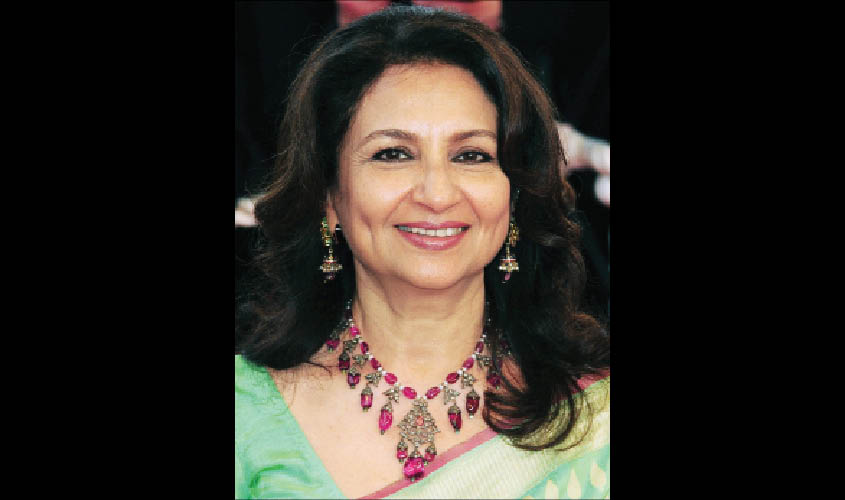Sharmila, distantly related to Rabindranath Tagore and married to the cricketer Mansoor Ali Khan Pataudi, has been a unique combination of beauty and brains, as well as a bridge between Hindi cinema and the best of the Bengali film world.
She was ahead of her time: she portrayed the most traditional roles as well as the most bindaas ones. The dimpled-faced actress who moved the hearts of millions as the suffering wife of Apu in Apur Sansar and as Pushpa in Amar Prem, could also act as a club dancer and appear in a bikini in An Evening in Paris, or could ignite the flames of sexuality in “Roop Tera Mastana” in Aradhana. At her prime, she was the highest-paid female actor in the country.
Sharmila beautifully balanced her two avatars—the serious persona of realist Bengali films, and the Bollywood persona of films with song-and-dance sequences focused on success at the box office. Even her Hindi films, some of which were made by Bengali directors, offered gripping stories, outstanding performances and conveyed some social message. She appeared in Satayjit Ray’s Apur Sansar when she was barely 14 years old. She further honed her histrionic talent in Ray’s films like Devi, Aranyer Din Ratri and Nayak. Other Bengalis who directed Sharmila included Tapan Sinha (Nirjan Saikate); Asit Sen (Safar); Hrishikesh mukherjee (Anupama,Satyakam); Basu Bhattacharya (Avishkaar); Uttam Kumar (Kalankini Kankabati); and Gautam Ghosh (Abar Aranye).
She is a versatile actor. Her roles in Apur Sansar and Devi have nothing in common with her role in An Evening in Paris. She portrayed two sharply contrasting characters in Gulzar’s Mausam and gave an endearing performance in his film Namkeen.
She acted with all the top actors of her generation from Bombay and Tollygunge. Some of her films, like Sawan Ki Ghata with Manoj Kumar, were big hits, while her other work—like Devar, Anupama and Satayakam were serious films with strong social commentary. Her role with Dharmendra in Chupke Chupke fell in the category of light comedy, though it was a far cry from today’s loud comedies like Hera Pheri or Golmaal. In Mausam, Grihapravesh and Namkeen Sharmila more than matched Sanjeev Kumar’s sublime acting.
She also had a long innings of hit films with two celebrated stalwarts of Bengali cinema: Soumitra Chatterjee and Uttam kumar. When Sharmila and Soumitra debuted together in Apur Sansar, Sharmila wasn’t intimidated by Soumitra’s unmistakable acting abilities. They acted together again in Ray’s Aranyer Din Ratri and in Barnali.
Bengali films such as Nayak, Shesh Anka, Anand Ashram, Amanush, Kalankini and Doorian offered Sharmila ample scope to go under the skin of the multi-layered characters and portray them on the screen with delicate nuances.
The actor with whom Sharmila shared her on-screen success most often was Rajesh Khanna, whose popularity had become a national craze bordering on hysteria. In Shakti Samanta’s Aradhana they clicked so well in that film, as in those unforgettable songs, “Kora Kagaz Tha Ye Man Mera” and “Mere Sapano Ki Rani Kab Ayegi Tu”. In that famous picturisation, with Sharmila sitting at the window of a train compartment and Kaka and Sujit Kumar keeping pace in a jeep and singing that song—she wasn’t actually in that train at all! Her portion was shot in a studio and added later. Their film Amar Prem was another milestone for both in terms of memorable performances, unforgettable songs, a moving story, huge commercial success and strong social message.
In Daag Sharmila was pitted against Rakhi and Kaka at his zenith. But she held her own and deservedly received many accolades.
Basu Bhattacharaya’s Avishkaar, allegedly based on Rajesh Khanna’s married life, was a complex film which delves into the subject marital discord. Sharmila gave a convincing performance in it, though the film belonged to Rajesh Khanna, who was cast in a totally deglamourised role.
Sharmila and Sanjeev Kumar’s Griha Pravesh was also part of Basu’s trilogy of films on the trials and tribulations of marriage, beginning with Anubhav. Sharmila gave a mature and sensitive performance in this film. One scene lingers in the mind much after the film is over. While she is cooking in the kitchen, Sanjeev hovers around. Sensing that something is bothering him, she softly asks if he has anything to say to her. Sanjeev nods and then drops the bombshell in almost a whisper: he has fallen in love with a young woman in his office! Sharmila doesn’t run out of kitchen, nor bursts into tears acting hysterical; she remains silent. Her silence in the face of the shocking revelation conveys more than a thousand words.
Further in her career, she also worked with Amitabh Bachchan in Faraar and Virudh, and with Naseeruddin Shah in Mangal Deep.
No other Bollywood actress has acted in as many films based on famous novels as Sharmila has. For example, Apur Sansar was based on a novel by Bibhutibhushan Bandyopadhyay; Safar on a novel by Asutosh Mukherjee.
Her eyes and the modulation of her voice were the soul of Sharmila’s acting. She was able to convey so much through her eyes, without uttering a word in films like Anupama and Devar.
In films such as Aradhana, Amar Prem, Daag and Griha Pravesh she adds so much more realism to her performance with the modulation of her voice. She didn’t copy anyone; her acting is rooted in the nuances of Bengali cinema.
Sharmila gave the biggest blockbusters in Bollywood with Shakti Samanta. Yash Chopra debuted as a director
She won two National Awards: Best actress for Mausam and Supporting Best Actress for Abar Aranye. She also won Filmfare’s Best Actress Award for Aradhana and a lifetime achievement award from Filmfare and Screen Awards. She has served as the Chief of the Censor Board and as the Goodwill Ambassador of UNICEF. In 2013, she was honoured with a Padma Bhushan by the Government of India.

